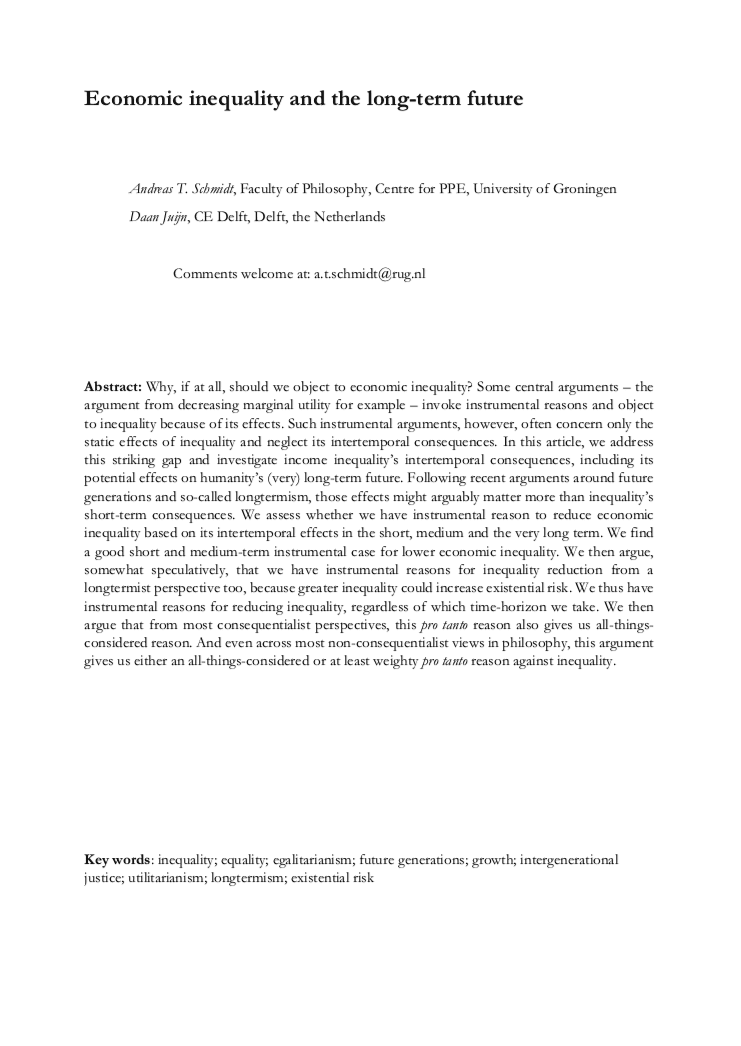Economic inequality and the long-term future
Andreas T. Schmidt (University of Groningen) and Daan Juijn (CE Delft)
GPI Working Paper No. 4-2021, published in Politics, Philosophy & Economics
Why, if at all, should we object to economic inequality? Some central arguments – the argument from decreasing marginal utility for example – invoke instrumental reasons and object to inequality because of its effects. Such instrumental arguments, however, often concern only the static effects of inequality and neglect its intertemporal consequences. In this article, we address this striking gap and investigate income inequality’s intertemporal consequences, including its potential effects on humanity’s (very) long-term future. Following recent arguments around future generations and so-called longtermism, those effects might arguably matter more than inequality’s short-term consequences. We assess whether we have instrumental reason to reduce economic inequality based on its intertemporal effects in the short, medium and the very long term. We find a good short and medium-term instrumental case for lower economic inequality. We then argue, somewhat speculatively, that we have instrumental reasons for inequality reduction from a longtermist perspective too, because greater inequality could increase existential risk. We thus have instrumental reasons for reducing inequality, regardless of which time-horizon we take. We then argue that from most consequentialist perspectives, this pro tanto reason also gives us all-things-considered reason. And even across most non-consequentialist views in philosophy, this argument gives us either an all-things-considered or at least weighty pro tanto reason against inequality.
Other working papers
Maximal cluelessness – Andreas Mogensen (Global Priorities Institute, Oxford University)
I argue that many of the priority rankings that have been proposed by effective altruists seem to be in tension with apparently reasonable assumptions about the rational pursuit of our aims in the face of uncertainty. The particular issue on which I focus arises from recognition of the overwhelming importance…
Numbers Tell, Words Sell – Michael Thaler (University College London), Mattie Toma (University of Warwick) and Victor Yaneng Wang (Massachusetts Institute of Technology)
When communicating numeric estimates with policymakers, journalists, or the general public, experts must choose between using numbers or natural language. We run two experiments to study whether experts strategically use language to communicate numeric estimates in order to persuade receivers. In Study 1, senders communicate probabilities of abstract events to receivers on Prolific, and in Study 2 academic researchers communicate the effect sizes in research papers to government policymakers. When…
Intergenerational equity under catastrophic climate change – Aurélie Méjean (CNRS, Paris), Antonin Pottier (EHESS, CIRED, Paris), Stéphane Zuber (CNRS, Paris) and Marc Fleurbaey (CNRS, Paris School of Economics)
Climate change raises the issue of intergenerational equity. As climate change threatens irreversible and dangerous impacts, possibly leading to extinction, the most relevant trade-off may not be between present and future consumption, but between present consumption and the mere existence of future generations. To investigate this trade-off, we build an integrated assessment model that explicitly accounts for the risk of extinction of future generations…

